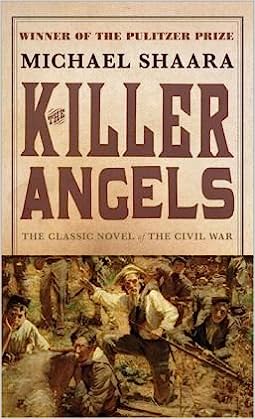 Cbr13bingo violence
Cbr13bingo violence
I read The Killer Angels about 20 years ago, and my lasting recollection was that I was surprised at how it drew me in and how much I liked it. Surprised because this novel, a work of historical fiction, is focused on the most momentous battle of the Civil War – Gettysburg. As much as I enjoy history and historical fiction, military history has never been terribly interesting to me. Michael Shaara accomplished something amazing with this novel: he made me interested in battle plans and outcomes by making me interested in the men on the ground responsible for carrying them out. Shaara shows readers the Battle of Gettysburg through the eyes of Confederate and Union colonels and generals, real people whose actions over three fateful days had enormous impact on the Civil War and US history.
The novel opens at the end of June 1863, when the Confederate Army has gone on the offensive in the North, hoping to bring a quick end to the war by cutting off the Union Army from Washington and destroying it. The Confederate Army under the leadership of Robert E. Lee is proud and confident. The war has been going their way and the promise of an offensive on Union ground is cause for excitement and celebration. One of the themes running through the novel is that of the importance of honor; it is honorable to push forward and fight courageously; it is dishonorable to go on the defensive and to avoid battle. The Confederate Army is large, but it is working with several disadvantages. Their weaponry is inferior to the Union’s; they are unfamiliar with the terrain; and the head of their cavalry, Jeb Stuart, has been out of touch for days. As the cavalry was responsible for reconnoitering and reporting on Union army movements, Stuart’s absence puts the Confederates at a significant disadvantage. Lee and his generals are unaware of the size of Union forces gathered on the higher, advantageous ground above Gettysburg, and they have a tendency to underestimate the Union’s ability and overestimate their own. The one exception is General Longstreet, a formidable commander, a career army man educated at West Point and experienced at war due to his time in the American West. Longstreet is furious with Stuart and tries to convince Lee that evasive action is the better course, but Lee, ever focused on “honor” and believing that their sheer strength and numbers will win the day, overrides Longstreet, setting up what will become one of the bloodiest battles of the war.
On the Union side, much of what we learn is through the eyes of Colonel Joshua Lawrence Chamberlain, a college professor of rhetoric at Bowdoin (he would later become its president and Governor of Maine). Chamberlain was not the typical military man; he was not a graduate of West Point as many Union and Confederate officers were, but he had a natural leadership ability with his men. Chamberlain and his men (the 20th Maine) were responsible for defending the Union Army’s left flank, on Little Round Top, in a momentous battle on July 2. Even knowing how it was going to turn out, I was on the edge of my seat reading about it. While Longstreet had the ear of General Lee and was often in conference with his fellow officers, Chamberlain had little interaction with superior officers; they received their orders and managed to hold the flank and repel the Confederates even as they ran out of munitions, food and water. Chamberlain’s quick thinking and brave action saved the Union Army from disaster and showed Longstreet, if not the rest of the Confederate officers, that they could not win at Gettysburg. The Confederate assault on July 3, 1863, was an unmitigated disaster as Longstreet foresaw, and a turning point in the war.
One of the strength’s of this novel is Shaara’s ability to immerse the reader in the culture of each side of the war. The Union soldiers have had little to celebrate but they seem to understand what they are fighting for: to save the United States and stop slavery. The Confederates seem more muddled in their thinking; captured soldiers don’t talk about fighting for slavery but rather for their “rights,” yet they cannot explain what that means to them. A British officer observing the Confederate Army is impressed with their fighting and leadership. He feels that Confederate officers are very much like the British upper class, but when he tells them that Britain cannot offer them military support due to their continued reliance on slavery, the officers are nonplussed. The officers speak of fighting for honor, family and their homeland, but as Longstreet points out to Lee, as former members of the US Army, they have violated their oaths, their code, when they opted to fight for the Confederacy. Is that honorable?
Shaara’s descriptions of battle, of injuries and deaths, is gruesome, but the Battle of Gettysburg was a gruesome business. One gets the sense of how fraught this battle was and how great the stakes for the outcome of the Civil War and for the fate of the Union. It’s a riveting read that appeals even to those, like me, who are not particularly interested in military history.
